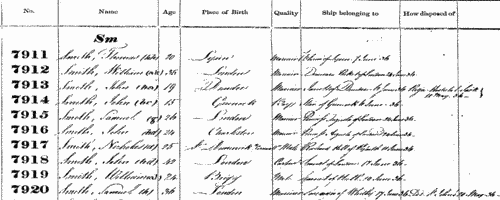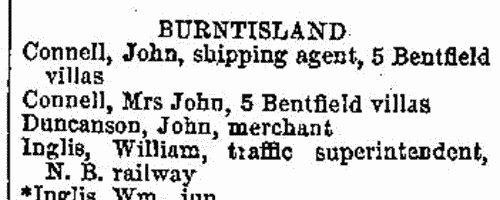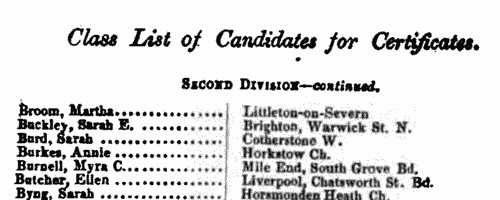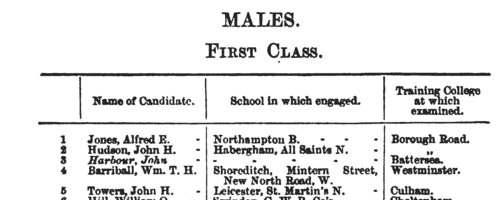Gauld Surname Ancestry ResultsOur indexes 1000-1999 include entries for the spelling 'gauld'. In the period you have requested, we have the following 56 records (displaying 1 to 10): Single Surname Subscription | | | Buying all 56 results of this search individually would cost £312.00. But you can have free access to all 56 records for a year, to view, to save and print, for £100. Save £212.00. More... |
These sample scans are from the original record. You will get scans of the full pages or articles where the surname you searched for has been found. Your web browser may prevent the sample windows from opening; in this case please change your browser settings to allow pop-up windows from this site. Scottish litigants, rebels and cautioners
(1610-1613)
The Privy Council of Scotland exercised a superior judicial authority in the kingdom, and consequently received and dealt with a constant stream of petitions, as well as dealing with the internal security of the state. This register of the council from July 1610 to February 1613, in the reign of king James VI, was edited by David Masson and published under the direction of the Deputy Clerk Register of Scotland in 1889. The publication starts with the Acta and Decreta, a chronological consolidation of material from Acta Secreti Concilii proper, the Decreta, the Book of Commissions, the Book of Sederunts, the Minute Book of Processes, and The Book of the Isles. There is then a section of Royal and Other Letters (pp. 565-644); then acts and bands (bonds) of caution (surety) from the registers called Acta Cautionis (pp. 647-690); and Miscellaneous Privy Council Papers (693-746). Many of the individuals mentioned are the complainants, those of whom they complained, and the sureties on both sides: at this period, many of the complainants are alleging serious attacks, often of a feuding nature. Many of the bonds entered into by the cautioners are promises to keep the peace towards such enemies. Failure to answer to the council when summoned was a serious contempt, leading to being denounced a rebel, with serious consequences.
GAULD. Cost: £4.00.  | Sample scan, click to enlarge

|  Masters and Apprentices
(1744) Masters and Apprentices
(1744)
Apprenticeship indentures and clerks' articles were subject to a 6d or 12d per pound stamp duty: the registers of the payments usually give the master's trade, address, and occupation, and the apprentice's father's name and address, as well as details of the date and length of the apprenticeship.GAULD. Cost: £8.00.  | Sample scan, click to enlarge

|  Apprentices registered in Scotland
(1760) Apprentices registered in Scotland
(1760)
Apprenticeship indentures and clerks' articles were subject to a 6d or 12d per pound stamp duty: the registers of the payments usually give the master's trade, address, and occupation, and the apprentice's name, as well as details of the date and length of the apprenticeship. There are central registers for collections of the stamp duty in London, as well as returns from collectors in the provinces. These collectors generally received duty just from their own county, but sometimes from further afield. The indentures themselves can date from a year or two earlier than this return. (The sample entry shown on this scan is taken from a Bristol return. Each entry has two scans, the other being the facing page with the details of the indenture, length of service, and payment of duty.) IR 1/53GAULD. Cost: £8.00.  | Sample scan, click to enlarge

|  Apprentices registered in Scotland
(1761) Apprentices registered in Scotland
(1761)
Apprenticeship indentures and clerks' articles were subject to a 6d or 12d per pound stamp duty: the registers of the payments usually give the master's trade, address, and occupation, and the apprentice's name, as well as details of the date and length of the apprenticeship. There are central registers for collections of the stamp duty in London, as well as returns from collectors in the provinces. These collectors generally received duty just from their own county, but sometimes from further afield. The indentures themselves can date from a year or two earlier than this return. (The sample entry shown on this scan is taken from a Bristol return. Each entry has two scans, the other being the facing page with the details of the indenture, length of service, and payment of duty.) IR 1/54GAULD. Cost: £8.00.  | Sample scan, click to enlarge

|  Masters of apprentices and clerks
(1793) Masters of apprentices and clerks
(1793)
Apprenticeship indentures and clerks' articles were subject to a 6d or 12d per pound stamp duty: the registers of the payments usually give the master's trade, address, and occupation, and the apprentice's name, as well as details of the date and length of the apprenticeship. 17 June to 31 December 1793. IR 1/36GAULD. Cost: £8.00.  | Sample scan, click to enlarge

|  British merchant seamen
(1835-1836) British merchant seamen
(1835-1836)
At this period, the foreign trade of ships plying to and from the British isles involved about 150,000 men on 15,000 ships; and the coasting trade about a quarter as many more. A large proportion of the seamen on these ships were British subjects, and so liable to be pressed for service in the Royal Navy; but there was no general register by which to identify them, so in 1835 parliament passed a Merchant Seamen's Registration Bill. Under this act this large register of British seamen was compiled, based on ships' crew lists gathered in British and Irish ports, and passed up to the registry in London. Each seaman was assigned a number, and the names were arranged in the register by first two letters of the surname (our sample scan shows one of the pages for 'Sm'); in addition, an attempt was made to separate out namesakes by giving the first instance of a name (a), the second (b), and so on. But no effective method was devised to prevent the same man being registered twice as he appeared in a second crew list; moreover, the original crew lists were clearly difficult for the registry clerks to copy, and some of the surname spellings appear to be corrupted. A parliamentary committee decided that the system devised did not answer the original problem, and this register was abandoned after less than two years: but it is an apparently comprehensive source for British merchant seamen in 1835 to 1836. The register records the number assigned to each man; his name; age; birthplace; quality (master, captain, mate, 2nd mate, mariner, seaman, fisherman, cook, carpenter, boy &c.); and the name and home port of his ship, with the date of the crew list (usually at the end of a voyage). Most of the men recorded were born in the British Isles, but not all (for instance, Charleston and Stockholm appear in the sample scan). The final column 'How disposed of' is rarely used, and indicates those instances where a man died, was discharged, or deserted his ship during the voyage.GAULD. Cost: £8.00.  | Sample scan, click to enlarge

| Scottish Abstainers
(1865)
Lists of members of the Scottish Temperance League, branch by branch; donations and subscriptions; officers of abstinence societies; and ministers connected with the league. Mostly Scotland, but including England, Ireland and the colonies.
GAULD. Cost: £6.00.  | Sample scan, click to enlarge

| Scottish Pupil Teachers training to become Schoolmistresses
(1875)
The Education Department set examinations for candidates for admission into training colleges, and to become teachers. This is the class list (in order of merit) of the women who took that examination at Christmas 1875, and who were awarded First Class results. The first column gives the position in the exam results (no number is inserted where the candidate obtained the same marks as the last to whose name a number is prefixed); then there is the candidate's name (surname first); school in which engaged (C. of S. or G. A. for schools connected with the General Assembly of the Established Church of Scotland, F. C. Free Church of Scotland, Epis. Episcopal Church of Scotland, R. Roman Catholic, Sessl. Sessional School, Pub. Public School, Undl. Undenominational); and then Training College at which examined. (The sample scan is from a general class list for schoolmistresses)GAULD. Cost: £6.00.  | Sample scan, click to enlarge

| Trainee Schoolmistresses at Aberdeen (Free Church)
(1876)
The Education Department set examinations of trainee teachers at the various training colleges in Britain. This is the class list of the women who took examinations at Aberdeen Free Church Teacher Training College at Christmas 1876. The names are given for the second year first, arranged by division in the examination (in order of merit for the first and second divisions), and then for the students of the first year, arranged similarly. Full names are given (with initials for middle names). The letter (D.) indicates that the candidate had obtained a certificate of competency as a teacher of drawing. GAULD. Cost: £6.00.  | Sample scan, click to enlarge

| Trainee Schoolmistresses in Scotland
(1876)
The Education Department set examinations for candidates for admission into training colleges, and for the office of teacher. This is the list of successful female candidates from Scotland at the examination in July 1876. The number in the first column shows order of merit in each class in the examination; then there is the name of the candidate (surname, christian name and any intermediate initial(s)), the school in which engaged, and the training college at which examined. The names of pupil teachers are shown in italics, with the 'school in which engaged' column left blank. These abbreviations are used in the names of schools: C. of S., Church of Scotland; Epis., Episcopal; F. C., Free Church; G. A., General Assembly (Church of Scotland); P., Parochial; Pub., Public; R. C., Roman Catholic; Sessl., Sessional; Undl., Undenominational.GAULD. Cost: £6.00.  | Sample scan, click to enlarge

|
Research your ancestry, family history, genealogy and one-name study by direct access to original records and archives indexed by surname.
|













